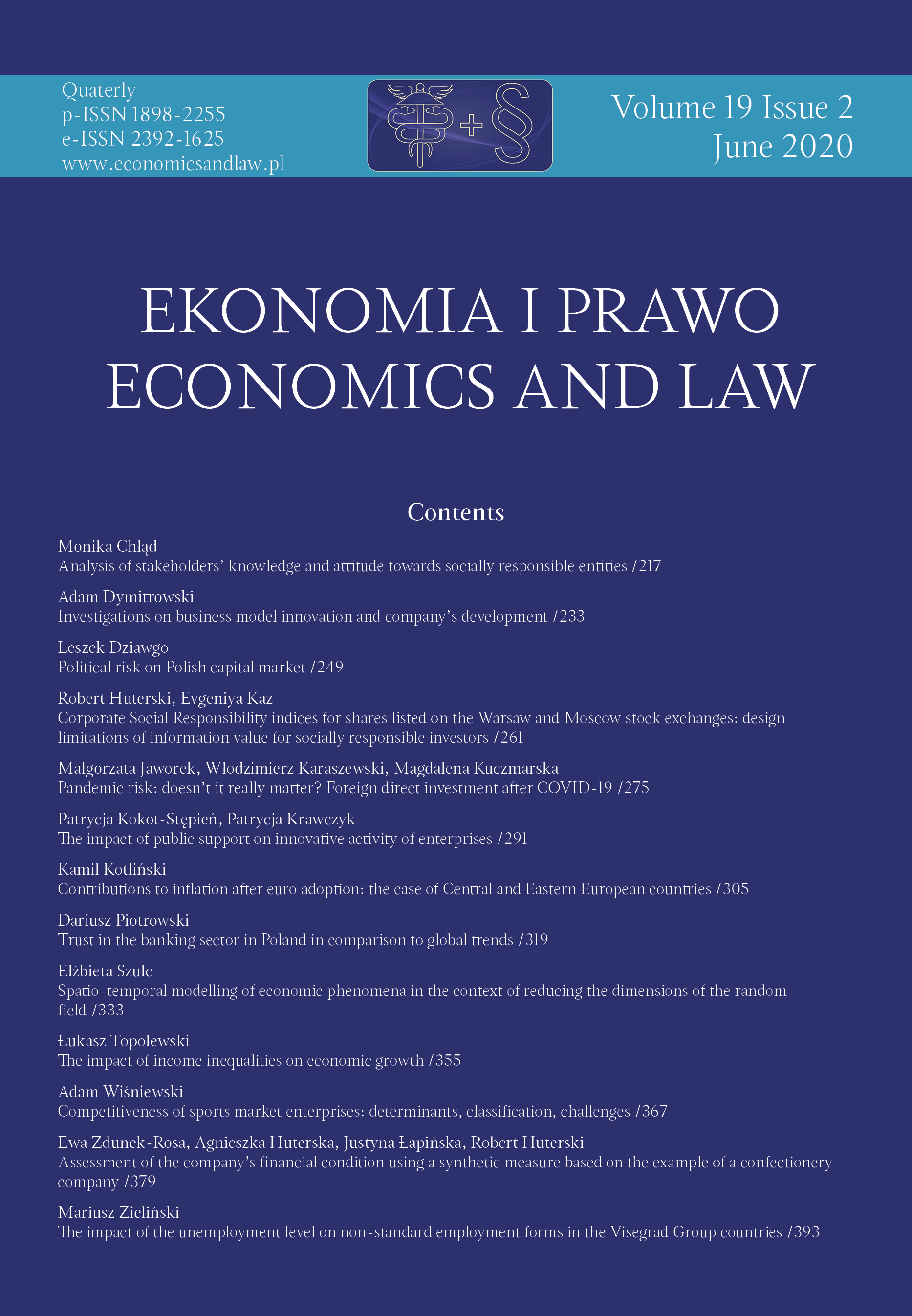Corporate Social Responsibility indices for shares listed on the Warsaw and Moscow stock exchanges: design limitations of information value for socially responsible investors
DOI:
https://doi.org/10.12775/EiP.2020.018Keywords
socially responsible investment, stock indices, CSR, ESGAbstract
Motivation: Investors often do not have the opportunity to assess how much a company is responsible for its relationships with employees, the environment, and consumers. This is not due to the fact that there are no socially responsible companies in Russia and Poland, but it is connected with low informational transparency about the activities of companies and low awareness of socially responsible investment. Well-designed CSR/ESG indexes can over time increase interest in socially responsible investing in stock exchanges and have a positive impact on more pro-social and pro-environmental behaviour of companies.
Aim: The aim of the article is to evaluate the construction of the CSR/ESG indices of the Warsaw and Moscow stock exchanges from the point of view of their information value for socially responsible investors with particular consideration given to coefficients of correlation with main indices and to coefficients of variation.
Results: The RESPECT, MRRT and MRSV indices constructions are dominated by the criteria of company selection like in the main indices and they do not give sufficient recognition to the achievements of the companies in the field of CSR. Building rankings that clearly differentiate companies in terms of the degree of their achievement of objectives of CSR is undoubtedly influenced by subjectivism in the selection of evaluated features and their importance. However, copying the set of companies from elementary indices to CSR ones seems unsuitable as it leads to very strong correlations between those indices, which makes them unattractive for investors when compared with the main ones.
References
Badia, G., Ferruz, L., & Cortez, M.C. (2019). The performance of socially responsible stock portfolios: international evidence. Paper presented at the EFMA European Financial Management Association 2019 Annual Meeting, Azores. Retrieved 10.11.2019 from https://efmaefm.org.
Baumol, W. (1991). Perfect markets and easy virtue: business ethics and the invisible hand. Cambridge: Blackwell.
Bebchuk, L.A., Cohen, A., & Wang, C.C. (2013). Learning and the disappearing association between governance and returns. Journal of Financial Economics, 108(2). doi:10.1016/j.jfineco.2012.10.004.
Borgers, A., Derwall, J., Koedijk, K., & ter Host, J. (2013). Stakeholder relations and stock returns: on errors in investors’ expectations and learning. Journal of Empirical Finance, 22. doi:10.1016/j.jempfin.2013.04.003.
Bowen, H. (1953). Social responsibilities of the businessman. New York: Harper.
Demirbag, M., Wood, G., Makhmadshoev, D., & Rymkevich, O. (2017). Varieties of CSR: institutions and socially responsible behaviour. International Business Review, 26(6). doi:10.1016/j.ibusrev.2017.03.011.
Doś, A., & Foltyn-Zarychta, M. (2016). Socially responsible investment market size in Poland: the content analysis. In D. Prochazka (Ed.), New trends in finance and accounting: proceedings of the 17th Annual Conference on Finance and Accounting. Cham: Springer. doi:10.1007/978-3-319-49559-0_60.
Drucker, P.F. (1954). The practice of management. New York: Collins.
Eccles, R.G., Ioannou, I., & Serafeim, G. (2014). The impact of corporate sustainability on organizational processes and performance. Management Science, 60(11). doi:10.1287/mnsc.2014.1984.
Edmans, A. (2011). Does the stock market fully value intangibles?: employee satisfaction and equity prices. Journal of Financial Economics, 101(3). doi:10.1016/j.jfineco.2011.03.021.
Frederick, W.C. (2006). Corporation, be good!: the story of corporate social responsibility. Indianapolis: Dog Ear Publishing.
Kabir, L.S. (2017). Socially responsible investing: a trend or a temporary phenomenon? Economics, Taxes & Law, 10(4).
Kempf, A., & Osthoff, P. (2007). The effect of socially responsible investing on portfolio performance. European Financial Management, 13(5). doi:10.1111/j.1468-036X.2007.00402.x.
Kołosowska, B., & Huterska, A. (2013). Wpływ działań społecznie odpowiedzialnych na redukcję kosztów operacyjnych na przykładzie wybranych spółek giełdowych należących do RESPECT index. Prace Naukowe Uniwersytetu Ekonomicznego we Wrocławiu, 297.
Lulewicz-Sas A., Kilon J. (2014). Analysis of the effectiveness of socially responsible investment funds in Poland. Economics & Management, 19(4). doi:10.5755/j01.em.19.4.8101.
Mikołajek-Gocejna, M. (2018). The environmental, social and governance aspects of social responsibility indices: a comparative analysis of European SRI indices. Comparative Economic Research, 21(3). doi:10.2478/cer-2018-0017.
Nelling, E., & Webb, E. (2009). Corporate social responsibility and financial performance: the virtuous circle revisited. Review of Quantitative Finance and Accounting, 32(2). doi:10.1007/s11156-008-0090-y.
RBC. (2012). Does socially responsible investing hurt investment returns? Retrieved 10.11.2019 from https://mafiadoc.com.
RBC. (2019). Does socially responsible investing hurt investment returns? Retrieved 10.11.2019 from https://www.rbcgam.com.
RSPP & MOEX. (2019). Sustainability indices: 2018 highlights. Retrieved 10.11.2019 from http://media.rspp.ru.
Savina, T.N. (2016). Socially responsible investing: theory and methodology of research. Financial Analytics: Science and Experience, 9(15).
Statman, M. (2006). Sociable responsible indexes: composition, performance, and tracking error. The Journal of Portfolio Management, 32(3). doi:10.3905/jpm.2006.628411.
Vanwalleghem, D. (2017). The real effects of sustainable & responsible investing. Economics Letters, 156. doi:10.1016/j.econlet.2017.04.008.
WSE. (2019a). GPW launches the WIG-ESG Index. Retrieved 10.11.2019 from https://www.gpw.pl.
WSE. (2019b). Report of the management board on the activity of the parent entity and the Giełda Papierów Wartościowych w Warszawie Group in 2018. Retrieved 10.11.2019 from https://www.gpw.pl.
WSE. (2019c). Retrieved 12.02.2020 from https://www.gpw.pl.
WSE. (2019d). Uchwała Nr 804/2019 Zarządu Giełdy Papierów Wartościowych w Warszawie S.A. z dnia 12 sierpnia 2019 r. w sprawie szczegółowych zasad konstrukcji i podawania do publicznej wiadomości indeksu WIG-ESG: annex. Retrieved 10.11.2019 from https://www.gpw.pl.
Downloads
Published
How to Cite
Issue
Section
Stats
Number of views and downloads: 943
Number of citations: 0
